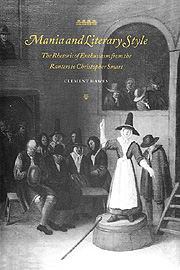Book contents
- Frontmatter
- Contents
- Acknowledgments
- Introduction: Mania as rhetoric
- PART I DEFIANT VOICE
- PART II PATRICIAN DIAGNOSIS
- PART III CHALLENGING LIMINALITY
- 5 Scribe-evangelist: popular writing and enthusiasm in Smart's Jubilate Agno
- 6 Double jeopardy: the provenance and reception of Jubilate Agno
- 7 Smart's bawdy politic: misogyny and the second Age of Horn in Jubilate Agno
- 8 Smart's poetics of place: myth versus utopia in Jubilate Agno
- Epilogue: Beyond pathology
- Index
- CAMBRIDGE STUDIES IN EIGHTEENTH-CENTURY ENGLISH LITERATURE AND THOUGHT
6 - Double jeopardy: the provenance and reception of Jubilate Agno
Published online by Cambridge University Press: 16 September 2009
- Frontmatter
- Contents
- Acknowledgments
- Introduction: Mania as rhetoric
- PART I DEFIANT VOICE
- PART II PATRICIAN DIAGNOSIS
- PART III CHALLENGING LIMINALITY
- 5 Scribe-evangelist: popular writing and enthusiasm in Smart's Jubilate Agno
- 6 Double jeopardy: the provenance and reception of Jubilate Agno
- 7 Smart's bawdy politic: misogyny and the second Age of Horn in Jubilate Agno
- 8 Smart's poetics of place: myth versus utopia in Jubilate Agno
- Epilogue: Beyond pathology
- Index
- CAMBRIDGE STUDIES IN EIGHTEENTH-CENTURY ENGLISH LITERATURE AND THOUGHT
Summary
For I am not without authority in my jeopardy, which I derive inevitably from the name of the Lord.
Christopher Smart, Jubilate Agno, B 1In being confined to an asylum, Christopher Smart suffered a dramatic shrinking of his own prospects – indeed, something akin to homelessness. like homeless people, at any rate, he had to endure a peculiar limbo, typical of homelessness, between public and private space. Smart was at once confined to a quasi-public space – one where, indeed, madhouse tourists apparently passed by him “on their tour,” as he bitterly writes – and yet largely excluded from the public sphere of communication. Stigmatized as mad for praying loudly in public, Smart had lost much of his own privacy and his status as a public man of letters.
The history of such confinement and stigmatization offers an essential context for understanding Smart's rhetorical strategies in Jubilate Agno. By Smart's time, a profound privatization and medicalization of madness was well underway. Much of Jubilate Agno, indeed, may be seen as a response precisely to the new understanding of “madness.” I refer not to the history of a disease, a timeless psychiatric entity, but to the history of a label, a reified category: that “madness,” strategically opposed to “reason,” whose career Michel Foucault traces in Histoire de la folie à l'âge classique.
- Type
- Chapter
- Information
- Mania and Literary StyleThe Rhetoric of Enthusiasm from the Ranters to Christopher Smart, pp. 155 - 178Publisher: Cambridge University PressPrint publication year: 1996



